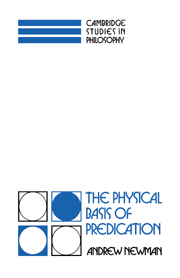Book contents
- Frontmatter
- Contents
- Acknowledgements
- Introduction
- Chapter 1 “Real constituents of the world”
- Chapter 2 What can logic and language tell us about reality?
- Chapter 3 The “existence” of universals and the notion of possibility
- Chapter 4 The causal significance of basic attributes
- Chapter 5 Hierarchies of universals
- Chapter 6 Causal relations
- Chapter 7 Arbitrary particulars and unified particulars
- Chapter 8 Further considerations concerning the causal relation
- Chapter 9 Arbitrary particulars and physical objects
- Bibliography
- Index
Chapter 3 - The “existence” of universals and the notion of possibility
Published online by Cambridge University Press: 04 May 2010
- Frontmatter
- Contents
- Acknowledgements
- Introduction
- Chapter 1 “Real constituents of the world”
- Chapter 2 What can logic and language tell us about reality?
- Chapter 3 The “existence” of universals and the notion of possibility
- Chapter 4 The causal significance of basic attributes
- Chapter 5 Hierarchies of universals
- Chapter 6 Causal relations
- Chapter 7 Arbitrary particulars and unified particulars
- Chapter 8 Further considerations concerning the causal relation
- Chapter 9 Arbitrary particulars and physical objects
- Bibliography
- Index
Summary
UNIVERSALS AND POSSIBILITY
It is central to immanent realism to conceive of a universal as an ontologically significant feature that can occur in many places at the same time. If a universal can occur many times or just once, it is equally possible for it not to occur at all. Nevertheless a sentence containing a predicate says something irrespective of whether the universal corresponding to the predicate occurs or not. For example, a sentence that denies that a certain object is regular chiliagon-shaped says something, even though that shape probably never has occurred and probably never will occur. Such sentences can be true, and we can understand what is being said, even though no object instances the universal concerned.
It appears, then, that talking about and referring to a universal is just as possible whether it occurs many times or not at all. It seems that, in one sense, whether “there is a universal” is independent of whether it occurs, and it also seems that the meaning of the corresponding predicate is also independent of whether the universal occurs.
In his book on universals, Armstrong took the position that it is important to separate the theory of meaning and the theory of universals, but later, in What Is a Law of Nature?, he took a slightly different view: “It may well be that it is impossible to explain the use of general words without postulating universals. ” This seems to be right.
- Type
- Chapter
- Information
- The Physical Basis of Predication , pp. 41 - 72Publisher: Cambridge University PressPrint publication year: 1992



